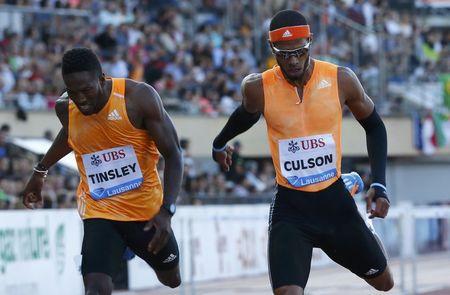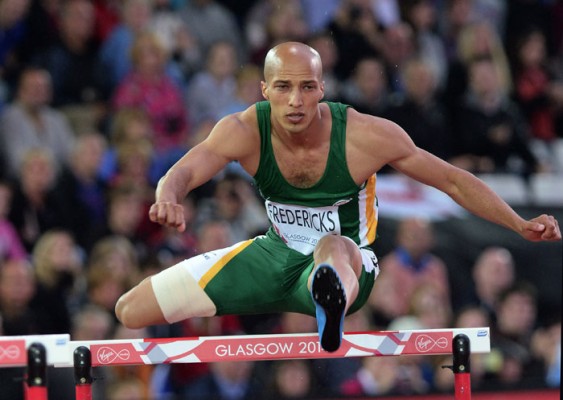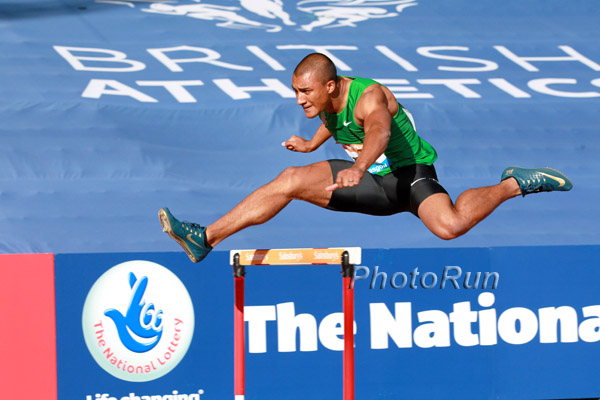Men’s 400m Hurdles: A Down Year
Well there are down years and then there are down years. In the men’s 400 meter hurdles, 2014 was definitely the down-est of down years. In other events, the lack of a major world championship meet did not mean a lack of some stellar performances and outstanding seasons. As discussed in the two most recent issues of The Hurdle Magazine, 2014 was a break-out year for Pascal Martinot-Lagarde and Orlando Ortega in the men’s 110’s, while Dawn Harper-Nelson and Queen Harrison battled throughout the summer for Diamond League supremacy in the women’s 100m hurdles.
There was not nearly as much drama, nor any comparatively compelling story lines, in the men’s 400h. Most of the excitement in the event came from Puerto Rico’s Javier Culson and Michael Tinsley of the USA. Culson finished the year with the fastest time of the year (48.03), but Tinsley edged him out for the Diamond League victory. The fact that the fastest time in the world was not under 48.00 is an indication that this was truly a down year. I can’t remember the last time nobody ran in the 47’s for an entire season.
[am4show not_have=”g5;”]
[/am4show][am4guest]
[/am4guest][am4show have=”g5;”]
All of the top ten fastest times belonged either to Culson, Tinsley, or Cornel Fredericks of South Africa. They were the only ones who competed at a level anywhere near the high standards they had set for themselves in previous years. Jehue Gordon of Trinidad, 2013 world champion in 47.69, could only manage a season’s best of 48.75 in 2014, good for second at Glasgow to Fredericks in late July. Living legend Bershawn Jackson shut down his season after injuring himself at the USA championships in June; his season’s best was 48.76, way off his personal best of 47.30 from back in 2005. Johnny Dutch earned his first USA championship after trying many times over the past six years, but his winning time (and season’s best) of 48.93 made him only the 19th-fastest in the world this year, and was far off his personal best of 47.63 from the 2010 national champs. Jeshua Anderson, who had been looking like he was going to take the professional ranks by storm when he was winning NCAA championships a few years ago, managed only a 49.22 in 2014, good for 33rd-fastest in the world.
Probably the biggest story in this event in 2014 was that of decathlete Ashton Eaton, who chose to take advantage of this down year by taking a crack at an event that does not appear in the multis. Despite his exceptional resume in the decathlon and the common opinion that he is arguably the greatest athlete in the world, just about everyone, including me, harbored doubts that he would be able to do anything of consequence in the “man-killer” event – the 400 hurdles. But Eaton did more than hold his own. Despite having average hurdling technique and no apparent race strategy in regards to stride pattern, Eaton started off decently and just kept getting better and better, bringing much welcomed attention to an event that had ceased to capture the public’s imagination.
Eaton finished the year with a personal and seasonal best of 48.69, good for 9th-fastest in the world. In a way, it’s a bit disturbing that he could just step into this event and do so well so quickly, but he does run the 110’s in the decathlon, so he knows how to hurdle. And he does run the 1500 in the decathlon, so endurance is not an issue for him. We can only wonder what heights he could reach in this event were he to stick with it. But with another World Championship year on the horizon, I feel safe in saying we may have seen the last of Ashton Eaton over the 400m barriers.
So, all things considered, would it be fair to say that the men’s 400h is an event in crisis? Had this been a World Championship or Olympic year, I would say yes. But if there is an event in which the competitors need a break, this would be the one. Even Edwin Moses took off an entire outdoor season in one of those years during his winning streak. So I’m assuming that the slower times this year were due to many athletes healing their bodies and taking all precautions in order to gear up for 2015.
But still, nobody under 48? Ever since John Akii-Bua crossed the finish line in 47.82 at the 1972 Olympic Games in Munich, it’s been pretty much expected that the best intermediate hurdlers in the world will run in the 47’s. Edwin Moses made it the gold standard for over a decade, taking the event to a whole new level, but despite his dominance in terms of victories, he wasn’t the only one running sub-48 on at least a fairly regular basis. In the 1980’s there were Harald Schmid, Danny Harris, and Andre Phillips. In the ’90’s there were Kevin Young, Derrick Adkins, and Samuel Matete. In the 2000’s there were Felix Sanchez, Kerron Clement, Jackson, Angelo Taylor, and James Carter.
So who is the hurdler now, in 2014 into 2015, who can consistently run sub-48? No disrespect to Ashton Eaton, but he shouldn’t be able to step into the event with no prior experience and run the 9th-fastest time in the world. If I’m an established 400 hurdler, I don’t want this decathlete dabbling in my event as a part-time hobby to finish anywhere close to me. Hopefully 2015 will prove that 2014 was an anomaly; hopefully we’ll see a lot of fast times and thrilling races, bringing this event back to its glory of past years.
[/am4show]



